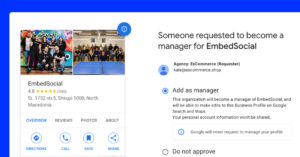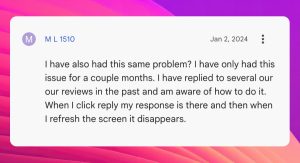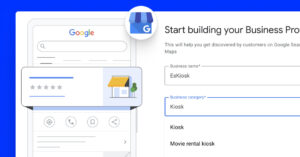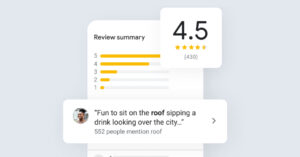In today’s interconnected digital world, first impressions often extend beyond face-to-face encounters; they are formed and shaped online.
This is why, in this article, we will cover everything you need to know about ORM and also share the most efficient online reputation management strategies.
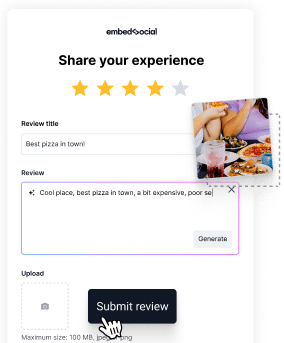
Collect reviews, feedback, and display testimonials widgets at scale!
Use complete reviews management software to generate and display Google reviews widgets on your website.
What is Online Reputation Management?
Online reputation management (ORM) happens when you actively monitor and react to your brand’s mentions on websites and social media.
Nowadays, people do it mostly to address any bad reviews or false comments.
At this point, you might wonder: Well, isn’t this the same with Public Relations (PR)?
Close, but not the same.
Although PR and ORM have the same purpose – to portray your company in the best possible light, PR is an external work that uses advertising and media relations to do this.
On the other hand, online reputation management is more of an internal thing because it’s most of the company’s time handled by employers.
How does ORM (Online Reputation Management) work?
ORM helps drive public opinion about a business and its products and services.
Here’s how online reputation management works:
Monitoring and assessment
Before any action can be taken, one needs to understand the current status of the brand’s reputation. This involves monitoring mentions across various platforms – websites, blogs, social media, and forums. Tools like Google Alerts, Mention, and Brandwatch can be used to track online mentions.
Positive content creation and promotion
Creating positive content helps push down any negative content in search engine results. This could be through blog posts, videos, testimonials, and other forms of content that promote a positive image of the brand or individual.
Search engine optimization (SEO)
ORM uses SEO techniques to ensure that positive content about a brand or individual appears prominently in search engine results. This means optimizing your website, creating high-quality backlinks, and utilizing keyword strategies that align with positive branding.
Managing negative content
Sometimes, it’s possible to remove or de-index negative content, especially if it’s false, defamatory, or violates the terms of a platform. In other cases, the brand strategy is to bury negative content by out-ranking it with positive or neutral content.
Engage and respond
Engaging with users, especially those who leave negative reviews or feedback, can be a way to manage one’s reputation. A well-crafted, timely response can mitigate damage and even turn a negative situation into a positive one.
Social media management
Social media platforms can make or break an online reputation. Regularly posting positive content, engaging with followers, and addressing concerns promptly can all boost a positive online image.
Read more: How to Manage Social Media Reputation?
What is an online reputation management strategy?
An ORM strategy refers to a coordinated plan of actions and methods used to monitor, influence, and improve the digital public perception of an organization, individual, or brand.
It involves monitoring online mentions, creating positive content, addressing negative feedback, engaging with audiences on social media, and optimizing online content to promote a favorable image.
Why use online reputation management strategies?
Here is a list of the benefits that a business can have from maintaining a good reputation:
- Highlights the strengths of a business
- Builds a positive brand image
- Help to counter negative comments from customers or competitors
- Increases the trust of your future customers so they will choose you over your competitor
- Establishes your brand as the primary source of whatever you provide as opposed to your rivals
Before you go lucky guessing whether your online reputation is fantastic or it’s variable, answer the questions in the section below.
They serve as the main factors that determine your online reputation to see where you stand:
What are the factors that determine your online reputation?
- Do you have dedicated customer service that answers customers’ questions promptly?
- Are there many places where your customers can review your products and services online?
- Do you respond to positive reviews, even star ratings?
- How do you handle negative reviews to solve your customer’s problems and improve your product or service?
- Do you maintain an active presence on social networks?
- Do you have a social media marketing strategy?
- Do you actively request reviews from your customers?
- Do you track your brand mentions on Google, Yahoo, or Bing?
- Do you track your brand mentions on your social media profiles?
- Do you display your customer reviews obtained on Yelp, Google, or social media platforms?
- How do you handle negative search results?
If you have answered ‘yes’ to most of these questions, you are on a good way to having an A+ online presence.
However, working on boosting your brand presence is something that can always be improved!
We prepared for you strategies that can help you improve your digital reputation management effectively.
All of them are at the touch of your fingers and can do wonders for your brand. All you need to do is give them a shot.

Collect reviews, feedback, and display testimonials widgets at scale!
Use complete reviews management software to generate and display Google reviews widgets on your website.
6 Popular Online Reputation Strategies
Below you will find several strategies that can help you enhance your online presence.
Make sure to give all of them a thought – you can never know what may ‘save’ your brand if you don’t try them, right?
1. Answer your customer questions promptly
Did you know that often a negative comment or review is posted after the customer has been waiting for a more extended period to receive an answer to their question?
Negative feedback can be easily avoided if you just have dedicated customer service agents that can tackle all the customer complaints.
For example, here at EmbedSocial, we have four customer service representatives that rotate in shifts in order to respond right away to all the customer queries.
As a result, our customer satisfaction rate has grown up to 95.4%, and it keeps on improving.
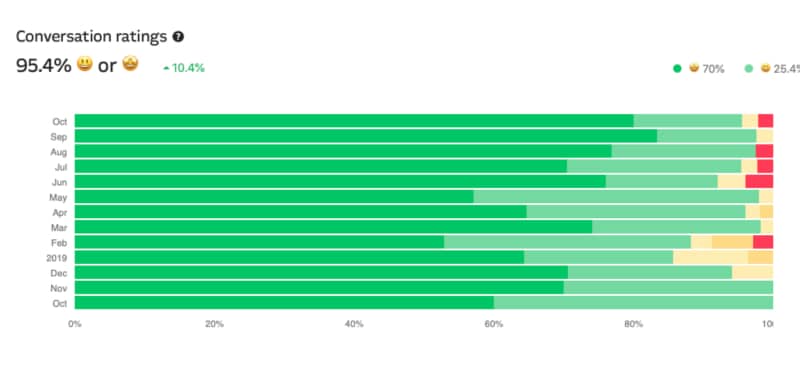
The rule of thumb is never to undermine customer service’s importance to your business. They are the people that can retain your customers and extract more value from them.
2. Address negative feedback with empathy
We have all been there. It is tempting to erase negative content from customers, but don’t dare to do that!
Hate to break it to you, but you cannot delete your Facebook comments; report them.
This statistic by Bright Local says it all:
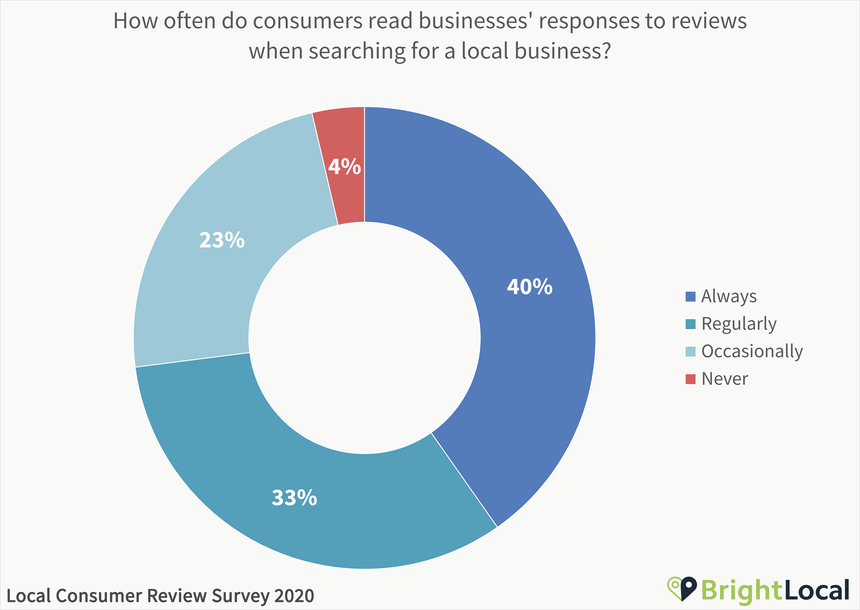
Although it sounds like you are in a trap, you can quickly turn the situation in your favor.
Addressing your negative customer reviews is one of the best online reputation management techniques.
As our friends, Jay Patel, online reputation influencer and founder of Bizrizer says:
Encourage customers to provide feedback on their experience. Address negative feedback in public (like a reply to negative Google feedback so others can see it). Be consistent with customer experience. Respond quickly and thank them for pointing out the issue. Negative reviews identify where the business has room for improvement. Now you have found the problem so fix it. I will focus on collecting more positive reviews to keep my reputation high as an average.
This is an example of how our team has handled a bad comment and turned it into positive content:
[example of bad comment we’ve received and how we have handled it]
For more tips on dealing with negative online reviews, please see our guide:
3. Collect and show reviews on your website
What is a better way to encourage receiving new reviews than showing them on your website?
You can do this manually or use review management tools like EmbedSocial. We developed this tool to help you acquire and display testimonials hands-free in just a few clicks.
Take a look at the options EmbedSocial gives you for collecting online reviews:
- Fetch reviews from different digital marketing channels like Facebook pages or Twitter, review sites like Yelp, or your Google locations in real time.
- Embed collect forms on your website so your visitors can submit their feedback for your local businesses directly there,
- Set up review request emails to ask and collect customer testimonials automatically.
- Upload all lists with reviews you already have using a CSV template.
- Using our official Zapier integration helps to collect reviews from other apps you already use.
For the purpose of our product pages, we collect the reviews on a particular product we’ve received on our social media channels and Google account, and we embed them on our website.
This is what it looks like:
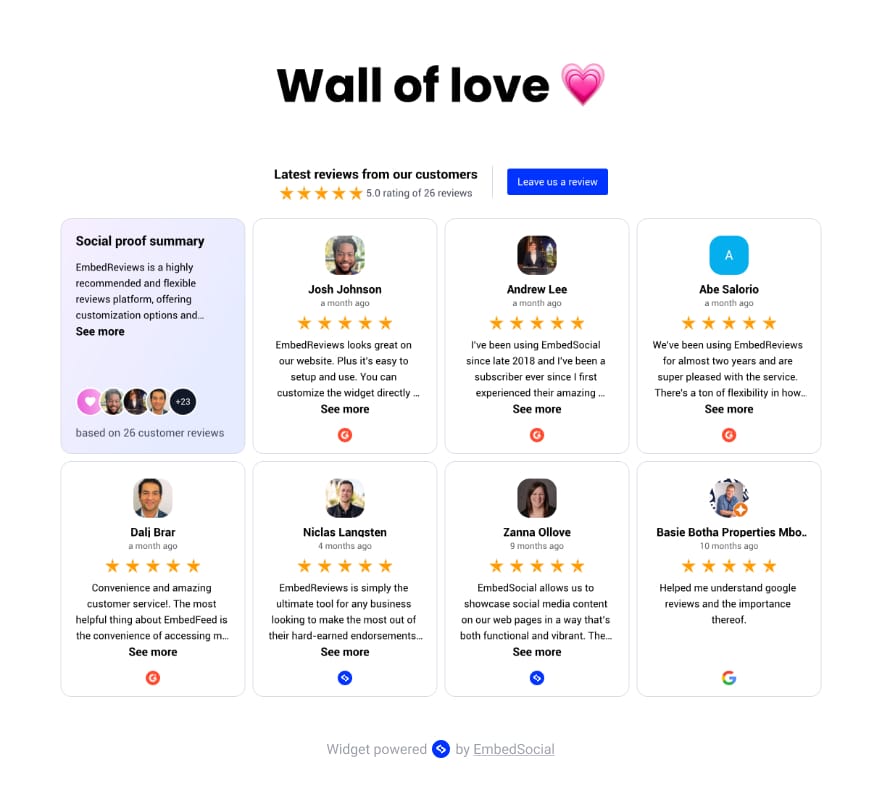
This way, customers that will land on this product page can read the experiences of other people like them and, based on that, decide whether this product can solve their pain point or they should move to the next tool (competitor).
However, when displaying customer testimonials, there is nothing to lose. You will gain your potential customers’ trust and get more sales on autopilot.
Read more: How to ask for reviews on Google?
4. Stay on top of the Google search results
Ideally, when you search your company name and the most relevant keyword around your brand, you want your company page to show up on Google’s first page, preferably as a first result.
Search engine optimization (SEO) is definitely one of the approaches that will help your brand stay visible. Google algorithms rank higher companies that have business reviews over those with no customer feedback at all.
SEO can also be an essential tool to minimize the visibility of negative online content and press associated with your brand.
Despite the tools, improving our search engine results can’t be possible without an SEO expert with an analytical mind and attention to detail.
Mihail Angelov, SEO Manager at EmbedSocial
Thus, don’t save money on SEO experts (both in-house and freelancers). They would not just make your company more visible but will also help your business scale.
Read more: ChatGPT Prompts for SEO for Online Reputation Management
5. Make your online brand reputation management on autopilot
You can manually go through websites and social media platforms on your own, or you can automate this process using monitoring tools.
One of the most straightforward monitoring tools you can try is Google Alerts.
It works very simply:
- You enter your brand name in the tool, and
- Once your company is mentioned, you receive notifications of media and news stories that talk about your company
- You can quickly respond to the content if necessary
We have set an alert for ‘EmbedSocial’, and this is how it looks when we get mentioned:
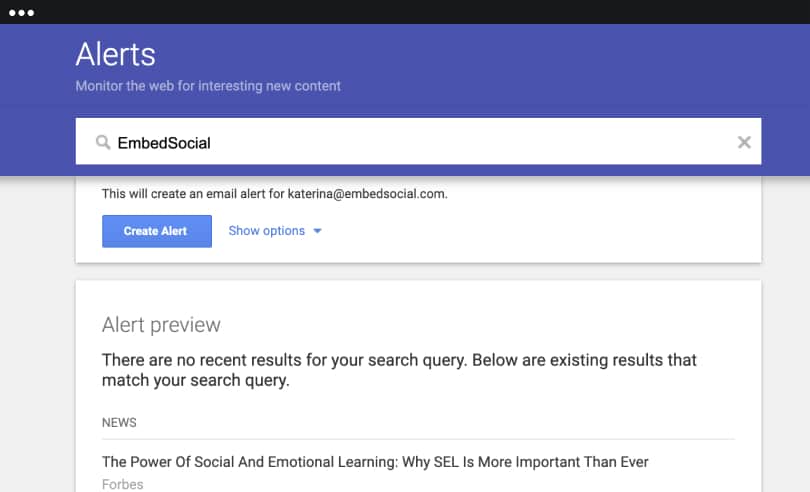
6. Hire an online reputation management company
There are many online reputation management services that can greatly enhance your brand’s online reputation (both online and offline).
Hiring an Online Reputation Management (ORM) service has many advantages. It builds online trust between you and your customers and can help you tackle or remove all sorts of inappropriate content. It can also be a cost-effective solution.
Yes, there are many benefits to hiring online reputation services. Before you do that, please ensure that you are hiring the right ORM service provider, as the cost of online reputation management can vary.
7. Try online reputation management software
In case you believe maintaining an online reputation is too much work for you, and you are not quite should if you want to hire a service to do the job instead of you, try EmbedSocial’s online reputation software.
It will help you to:
- Generate third-party reviews in one place, on autopilot – such as reviews from Facebook and Google.
- Receive and respond to reviews from one single platform.
- Create live widgets that will sync reviews on your website.
- Hand-pick or moderate which reviews to display on your website.
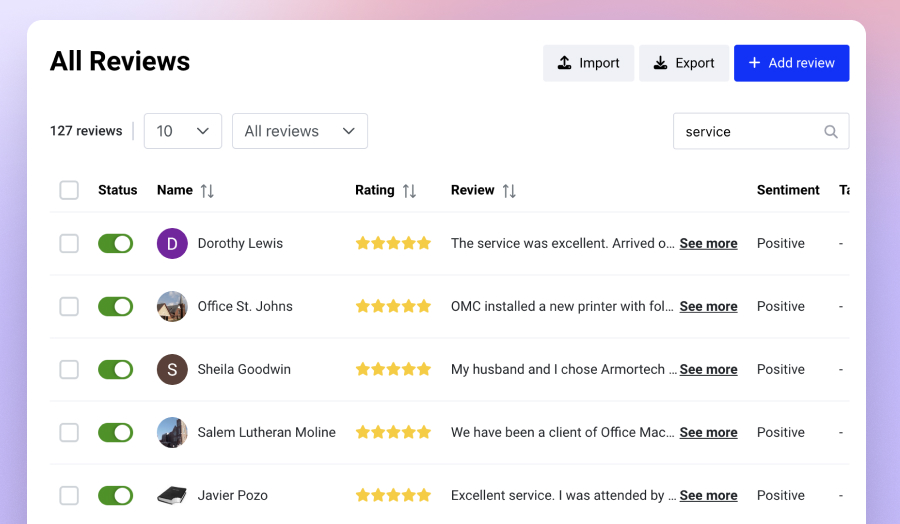
And much more. It’s worth the investment of 62x. Don’t take our word. Check out our customer success story.
To Wrap Up
Online reputation management (ORM) has become indispensable to modern business and personal branding.
Effective ORM strategies encompass proactive measures such as generating positive content, engaging with audiences authentically, and promptly addressing negative feedback.
Furthermore, by leveraging analytics, following the latest ORM trends and monitoring tools, you can anticipate issues and respond promptly, ensuring that the digital portrayal of a brand or individual aligns
FAQ:
Online Reputation Management (ORM) focuses on monitoring and shaping a brand’s or individual’s digital perception, primarily through search engine results and online content. Public Relations (PR), on the other hand, involves managing the overall public image and perception of a brand or individual through media relations, events, and strategic communications, both online and offline.
Monitoring your online reputation involves a combination of manual searches and utilizing specialized tools. Here’s how you can do it:
– Manual Searches
– Set Up Alerts (e.g., Google Alerts)
– Use Specialized Tools (e.g., Mention, Brandwatch)
– Monitor Social Media
– Track Reviews on Relevant Sites
– Analyze Data
– Engage with Your Audience
– Competitor Analysis
– Consider Professional Help
To improve your business online reputation management:
– Monitor online mentions regularly.
– Create and promote positive content.
– Address negative feedback promptly.
– Engage proactively on social media.
– Encourage satisfied customers to leave positive reviews.
– Optimize SEO to favor positive content.
– Be transparent and admit to mistakes when necessary.
Online reputation management (ORM) aims to monitor, influence, and improve the digital public perception of an individual, brand, or organization, ensuring that it reflects their values, achievements, and positive actions.

Embed Google Reviews Widget
Automatically collect and embed Google reviews and use AI reviews management tools to unlock your website’s sales potential.
FYI: You can automatically embed Google reviews widget on your website and show authentic user-generated reviews, increasing trust for more sales. Try it now.



